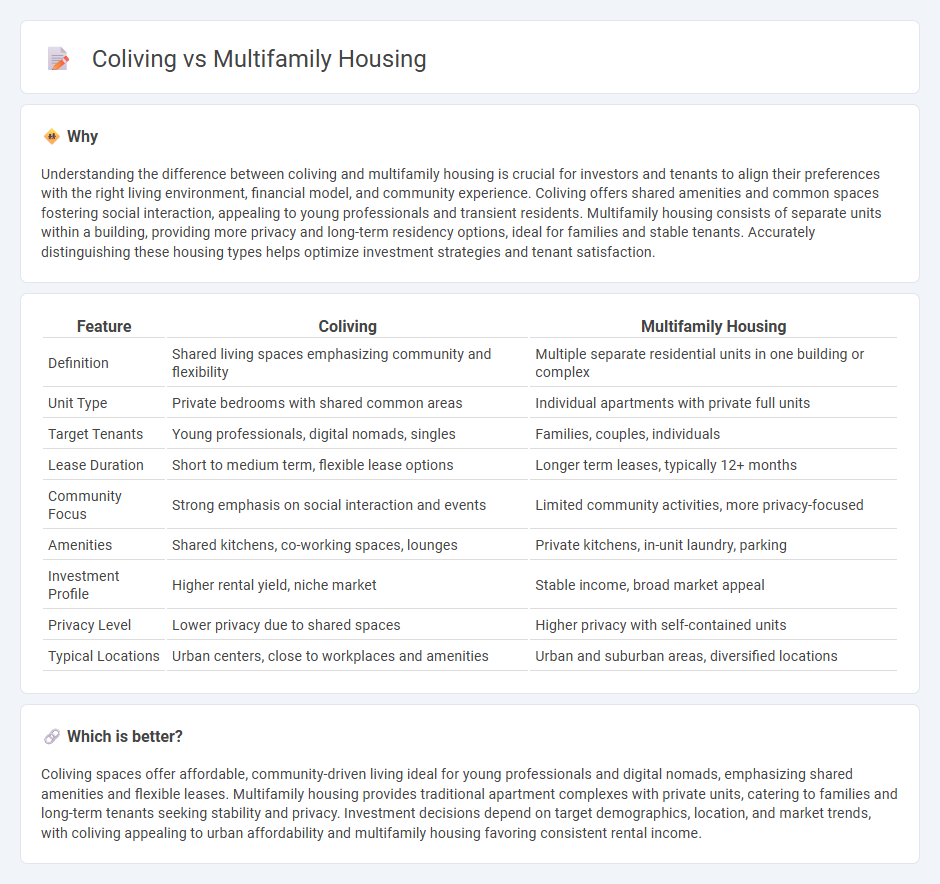
Coliving spaces offer fully furnished private rooms with shared common areas, targeting young professionals and urban dwellers looking for flexibility and community. Multifamily housing consists of apartment complexes or duplexes designed for longer-term residency, appealing to families and individuals seeking privacy and stability. Explore the key differences between coliving and multifamily housing to determine which option suits your lifestyle and investment goals.
Why it is important
Understanding the difference between coliving and multifamily housing is crucial for investors and tenants to align their preferences with the right living environment, financial model, and community experience. Coliving offers shared amenities and common spaces fostering social interaction, appealing to young professionals and transient residents. Multifamily housing consists of separate units within a building, providing more privacy and long-term residency options, ideal for families and stable tenants. Accurately distinguishing these housing types helps optimize investment strategies and tenant satisfaction.
Comparison Table
| Feature | Coliving | Multifamily Housing |
|---|---|---|
| Definition | Shared living spaces emphasizing community and flexibility | Multiple separate residential units in one building or complex |
| Unit Type | Private bedrooms with shared common areas | Individual apartments with private full units |
| Target Tenants | Young professionals, digital nomads, singles | Families, couples, individuals |
| Lease Duration | Short to medium term, flexible lease options | Longer term leases, typically 12+ months |
| Community Focus | Strong emphasis on social interaction and events | Limited community activities, more privacy-focused |
| Amenities | Shared kitchens, co-working spaces, lounges | Private kitchens, in-unit laundry, parking |
| Investment Profile | Higher rental yield, niche market | Stable income, broad market appeal |
| Privacy Level | Lower privacy due to shared spaces | Higher privacy with self-contained units |
| Typical Locations | Urban centers, close to workplaces and amenities | Urban and suburban areas, diversified locations |
Which is better?
Coliving spaces offer affordable, community-driven living ideal for young professionals and digital nomads, emphasizing shared amenities and flexible leases. Multifamily housing provides traditional apartment complexes with private units, catering to families and long-term tenants seeking stability and privacy. Investment decisions depend on target demographics, location, and market trends, with coliving appealing to urban affordability and multifamily housing favoring consistent rental income.
Connection
Coliving and multifamily housing intersect through their shared focus on maximizing space and fostering community within residential developments. Multifamily housing provides the structural framework of multiple separate units under one roof, enabling efficient land use and scalability. Coliving enhances this model by integrating shared amenities and social areas, promoting affordability and social interaction among residents.
Key Terms
Lease Structure
Multifamily housing leases typically involve individual contracts for each unit, offering long-term stability with fixed terms usually ranging from 12 to 24 months, providing tenants with exclusive control over their private space. Coliving lease structures often feature flexible, month-to-month agreements that include shared amenities and communal areas, catering to a dynamic lifestyle and fostering social interaction among residents. Explore further to understand which lease model aligns best with your living preferences and financial goals.
Privacy Levels
Multifamily housing offers individual apartments with private amenities, ensuring high privacy levels for residents through separate entrances and soundproof walls. Coliving spaces emphasize shared common areas such as kitchens and lounges, leading to lower privacy but fostering social interactions among occupants. Explore deeper insights on how privacy preferences impact your housing choice.
Shared Amenities
Multifamily housing offers shared amenities such as fitness centers, laundry facilities, and common lounges designed for long-term residents, enhancing convenience and community living. Coliving spaces emphasize shared amenities including coworking areas, communal kitchens, and social events that foster networking and collaboration among short-term residents. Explore more to understand which living option best suits your lifestyle and amenity preferences.
Source and External Links
Multifamily residential - Multifamily housing refers to buildings or complexes containing multiple separate residential units, such as apartments, condominiums, or townhouses, where units may be owned individually or leased from a single owner.
Multifamily Homes: Types and Trends - Multifamily homes, which make up over 30% of U.S. housing, include apartment buildings, condominiums, townhouses, and mixed-use developments, and are increasingly popular due to amenities like fitness centers, smart technology, and communal spaces.
Office of Multifamily Housing - The U.S. Office of Multifamily Housing provides mortgage insurance, rental assistance, and preservation programs to support the construction, rehabilitation, and affordability of multifamily rental properties for a diverse range of residents.
 dowidth.com
dowidth.com